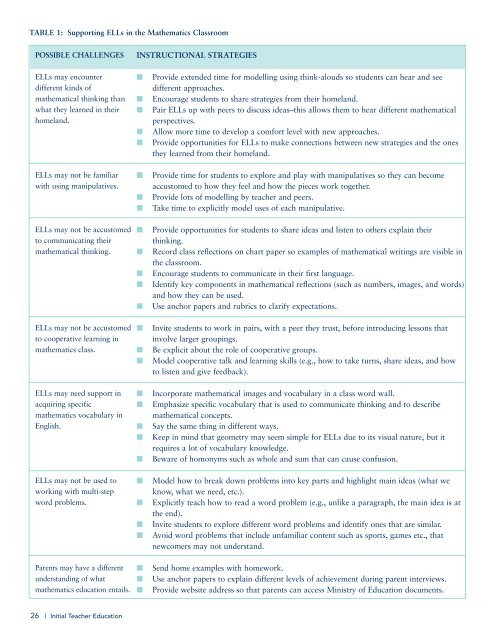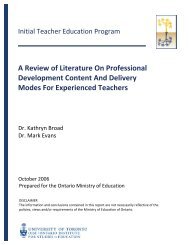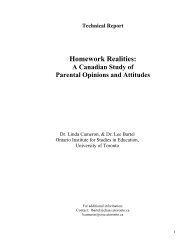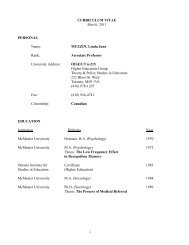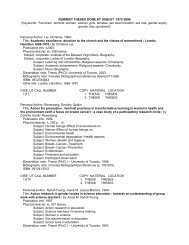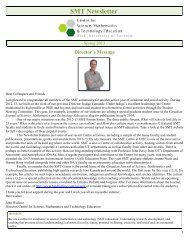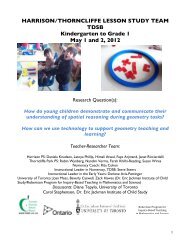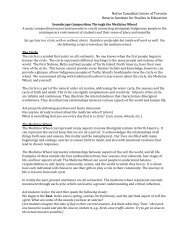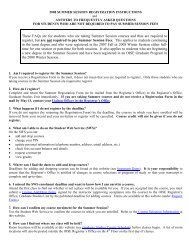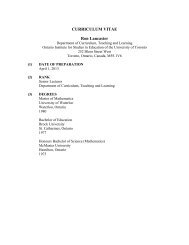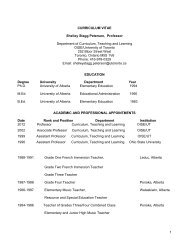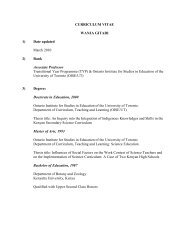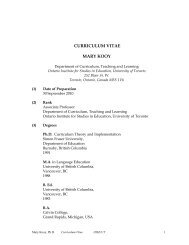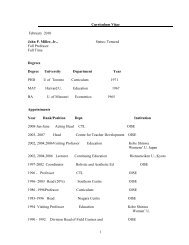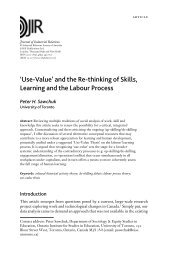Initial Teacher Education: Enriching and Extending Partnerships
Initial Teacher Education: Enriching and Extending Partnerships
Initial Teacher Education: Enriching and Extending Partnerships
You also want an ePaper? Increase the reach of your titles
YUMPU automatically turns print PDFs into web optimized ePapers that Google loves.
TABLE 1: Supporting ELLs in the Mathematics Classroom<br />
POSSIBLE CHALLENGES<br />
INSTRUCTIONAL STRATEGIES<br />
ELLs may encounter<br />
different kinds of<br />
mathematical thinking than<br />
what they learned in their<br />
homel<strong>and</strong>.<br />
ELLs may not be familiar<br />
with using manipulatives.<br />
ELLs may not be accustomed<br />
to communicating their<br />
mathematical thinking.<br />
ELLs may not be accustomed<br />
to cooperative learning in<br />
mathematics class.<br />
ELLs may need support in<br />
acquiring specific<br />
mathematics vocabulary in<br />
English.<br />
ELLs may not be used to<br />
working with multi-step<br />
word problems.<br />
Parents may have a different<br />
underst<strong>and</strong>ing of what<br />
mathematics education entails.<br />
■<br />
■<br />
■<br />
■<br />
■<br />
■<br />
■<br />
■<br />
■<br />
■<br />
■<br />
■<br />
■<br />
■<br />
■<br />
■<br />
■<br />
■<br />
■<br />
■<br />
■<br />
■<br />
■<br />
■<br />
■<br />
■<br />
■<br />
■<br />
Provide extended time for modelling using think-alouds so students can hear <strong>and</strong> see<br />
different approaches.<br />
Encourage students to share strategies from their homel<strong>and</strong>.<br />
Pair ELLs up with peers to discuss ideas–this allows them to hear different mathematical<br />
perspectives.<br />
Allow more time to develop a comfort level with new approaches.<br />
Provide opportunities for ELLs to make connections between new strategies <strong>and</strong> the ones<br />
they learned from their homel<strong>and</strong>.<br />
Provide time for students to explore <strong>and</strong> play with manipulatives so they can become<br />
accustomed to how they feel <strong>and</strong> how the pieces work together.<br />
Provide lots of modelling by teacher <strong>and</strong> peers.<br />
Take time to explicitly model uses of each manipulative.<br />
Provide opportunities for students to share ideas <strong>and</strong> listen to others explain their<br />
thinking.<br />
Record class reflections on chart paper so examples of mathematical writings are visible in<br />
the classroom.<br />
Encourage students to communicate in their first language.<br />
Identify key components in mathematical reflections (such as numbers, images, <strong>and</strong> words)<br />
<strong>and</strong> how they can be used.<br />
Use anchor papers <strong>and</strong> rubrics to clarify expectations.<br />
Invite students to work in pairs, with a peer they trust, before introducing lessons that<br />
involve larger groupings.<br />
Be explicit about the role of cooperative groups.<br />
Model cooperative talk <strong>and</strong> learning skills (e.g., how to take turns, share ideas, <strong>and</strong> how<br />
to listen <strong>and</strong> give feedback).<br />
Incorporate mathematical images <strong>and</strong> vocabulary in a class word wall.<br />
Emphasize specific vocabulary that is used to communicate thinking <strong>and</strong> to describe<br />
mathematical concepts.<br />
Say the same thing in different ways.<br />
Keep in mind that geometry may seem simple for ELLs due to its visual nature, but it<br />
requires a lot of vocabulary knowledge.<br />
Beware of homonyms such as whole <strong>and</strong> sum that can cause confusion.<br />
Model how to break down problems into key parts <strong>and</strong> highlight main ideas (what we<br />
know, what we need, etc.).<br />
Explicitly teach how to read a word problem (e.g., unlike a paragraph, the main idea is at<br />
the end).<br />
Invite students to explore different word problems <strong>and</strong> identify ones that are similar.<br />
Avoid word problems that include unfamiliar content such as sports, games etc., that<br />
newcomers may not underst<strong>and</strong>.<br />
Send home examples with homework.<br />
Use anchor papers to explain different levels of achievement during parent interviews.<br />
Provide website address so that parents can access Ministry of <strong>Education</strong> documents.<br />
26 | <strong>Initial</strong> <strong>Teacher</strong> <strong>Education</strong>


